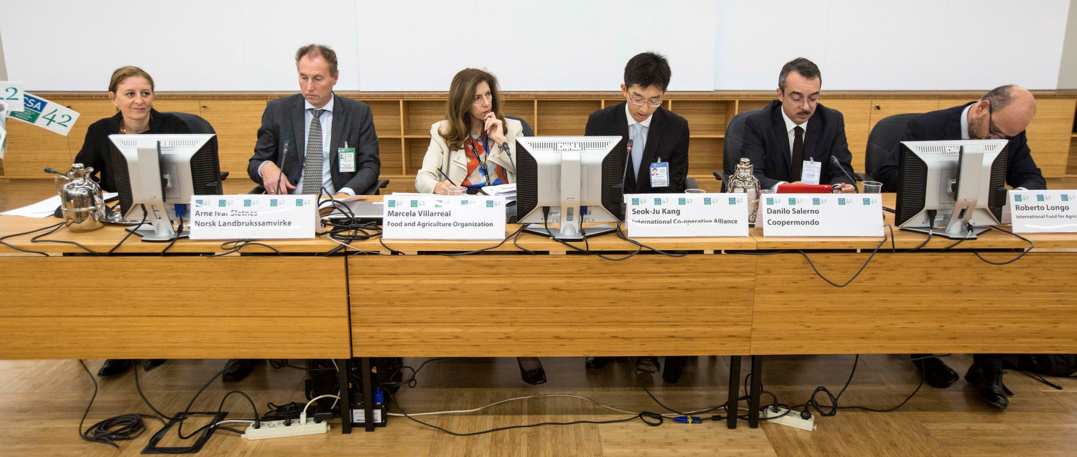How exactly can agriculture cooperatives and producer organisations contribute to global food security and increased nutrition in the context of the recently adopted Sustainable Development Goals? What do cooperatives need from governments and the international community to make those contributions?
These were the questions answered at a 15th October side event organised by COPAC during the Committee on World Food Security in Rome, Italy. More than 30 participants from international organisations, governments, civil society and the private sector participated in the event, ‘Cooperative enterprises and producer organizations: Empowering producers to build a healthier, food-secure world’.
Opening the event was Marcela Villarreal, Director of the Office for Partnerships, Advocacy and Capacity Development at the Food and Agriculture Organization (FAO). Villarreal highlighted the significance of the inclusion of food security, nutrition and agriculture in many of the recently adopted Sustainable Development Goals (SDGs), which underscores the sector’s potential and its role as an engine of development. In particular, agricultural cooperatives and producer organizations that are democratic and inclusive (of women and youth) can empower small-scale producers to secure their livelihoods and lift themselves out of poverty by creating economic and social opportunities.
Seok-ju Kang, Agricultural Adviser for the International Co-operative Alliance, discussed how the 2030 Agenda adopted by the UN mentions cooperatives as important private sector actors to implement the SDGs. Kang confirmed the cooperative movement’s commitment to work with the UN and other institutions throughout implementation, and highlighted the economic and social power of cooperative enterprises as partners in development work.
Arne Ivar Sletnes, Head of International Affairs for Norsk Landbrukssamvirke (Federation of Norwegian Agricultural Cooperatives), discussed how cooperatives in Norway secure farming on the limited arable land available. He noted that in light of the need to double agricultural productivity and secure profitability, small-scale producers need to join as cooperatives, which offer collective bargaining power, access to markets, a greater share of the values created in the food chain and a stronger basis for innovation and provision of services (infrastructure, information, training, etc.). Creating favourable conditions for cooperatives will require awareness raising about the benefits of cooperation (particularly among young people), an enabling legal environment and public-private partnerships.
Danilo Salerno, Director of Coopermondo, discussed the need to upscale sustainable funding for international development projects supporting cooperatives, in order to properly service projects and ensure their quality. He underscored the importance of stronger, bottom-up partnerships with international organisations such as the UN to foster an enabling environment for cooperatives to develop. Development projects for cooperatives also require an upscale to improve them socially as well as technically, an aspect often under-emphasised even though cooperatives provide a significant degree of social protection.
Roberto Longo, Senior Technical Specialist for Farmers’ Organizations and Markets at the International Fund for Agricultural Development (IFAD), noted that cooperatives and producer organizations are recognised as key instruments for ending hunger and increasing food security in the Financing for Development Outcome Document. He cited two examples of cooperative success in the value chain: in the Kivu region of the Democratic Republic of the Congo and in East Africa, which saw in January 2005 the passage of a cooperative bill tailored to cooperatives’ needs. He emphasised the importance of identifying cooperatives’ needs and scaling up efforts accordingly to meet them, as well as supporting cooperatives to understand policy processes and improve their engagement in them.
During the Q&A session, the participants and speakers discussed the role of education and advocacy to improve the regulatory environment in countries where governments remain sceptical of the model. Mr Kang spoke about the Global Cooperative Impact Fund to facilitate cooperative-to-cooperative support, mainly in Africa. On the topic of how cooperatives can maintain competitiveness in a food market that increasingly favours low-cost products, speakers cited the need to improve and adapt like any other businesses and to focus on the value of cooperatives in providing services. Cooperatives must also insert themselves along the whole food chain (cooperation among consumer and agricultural cooperatives, for example). Regarding the challenge presented by complex cooperative relationships (farmer v. owner v. member) to maintaining competitiveness, the speakers emphasised the need for strong governance to overcome obstacles and innovate.
In closing the event, Nora Ourabah Haddad, Coordinator of Cooperatives and Producer Organizations Partnerships at FAO, stressed the key role of agricultural cooperatives in delivering the SDGs, particularly given their long-term visions and their unique approach to economic efficiency and social benefits for their members. She proposed that challenges faced by cooperatives could be overcome including by emphasising the importance of their unique value as autonomous businesses that are jointly-owned and democratically controlled by their members, putting in place supportive policies and regulatory frameworks, as well as through advocacy and education efforts. While there is currently a lack of data on cooperatives, COPAC will continue working to address this issue. Ms Ourabah Haddad concluded by underscoring the significance of public-private partnerships to help cooperatives take the SDGs forward and build a more enabling environment for their growth.

